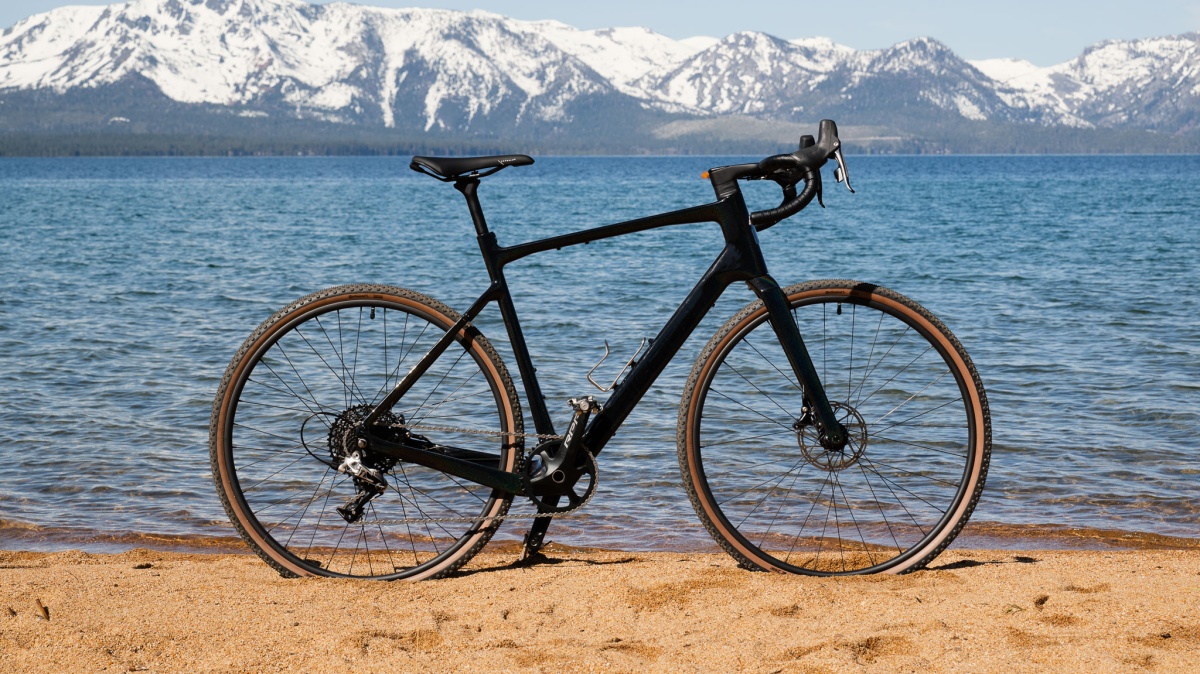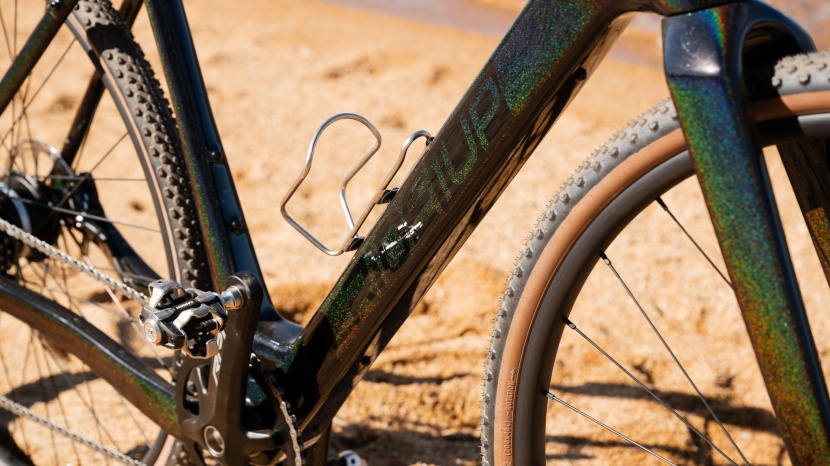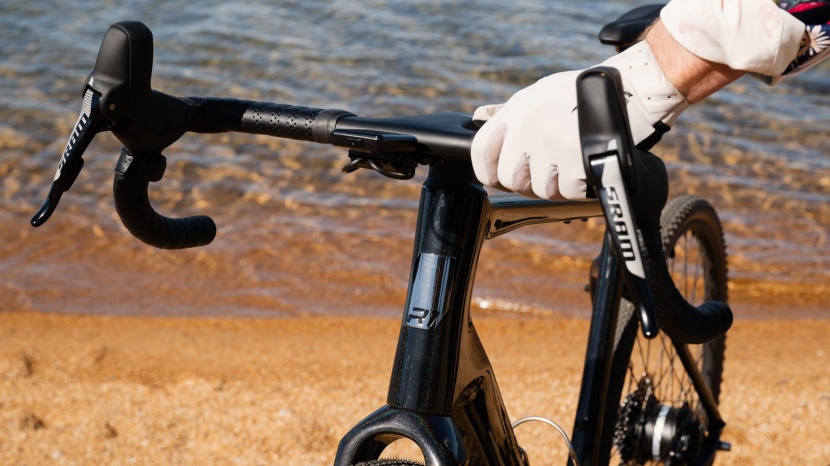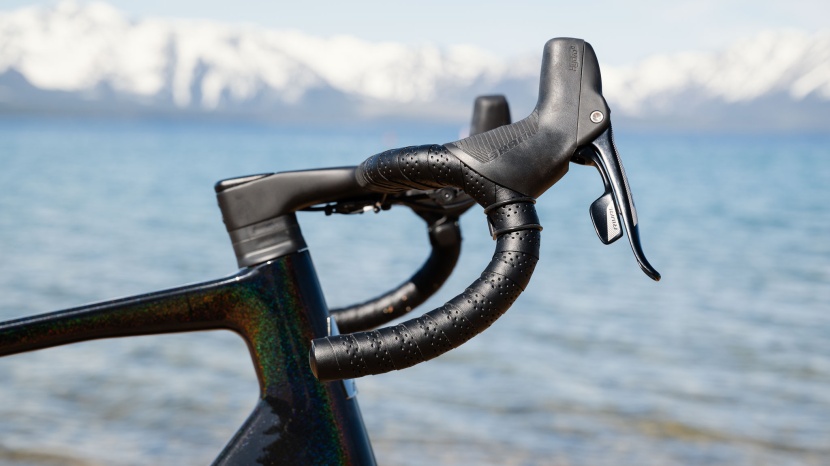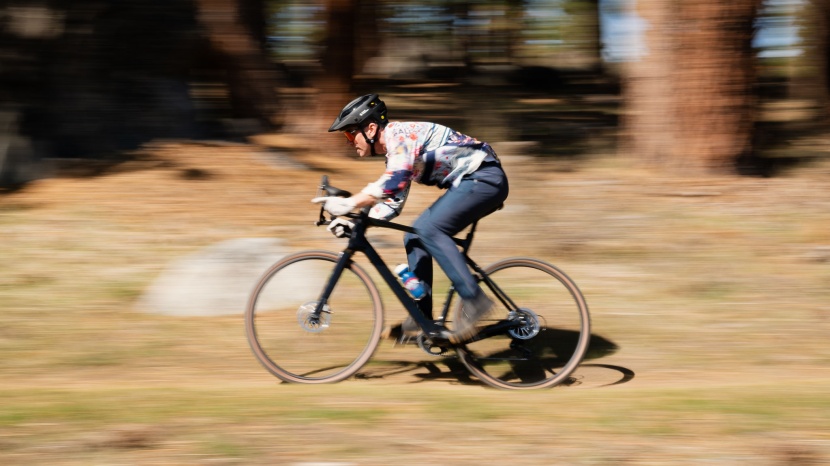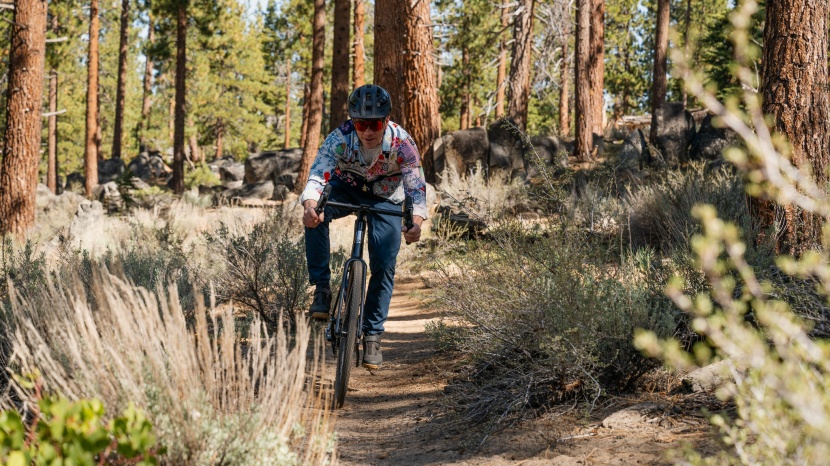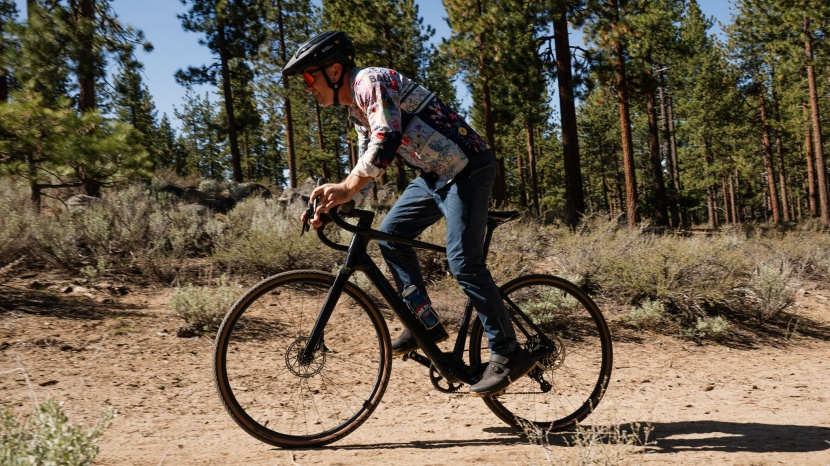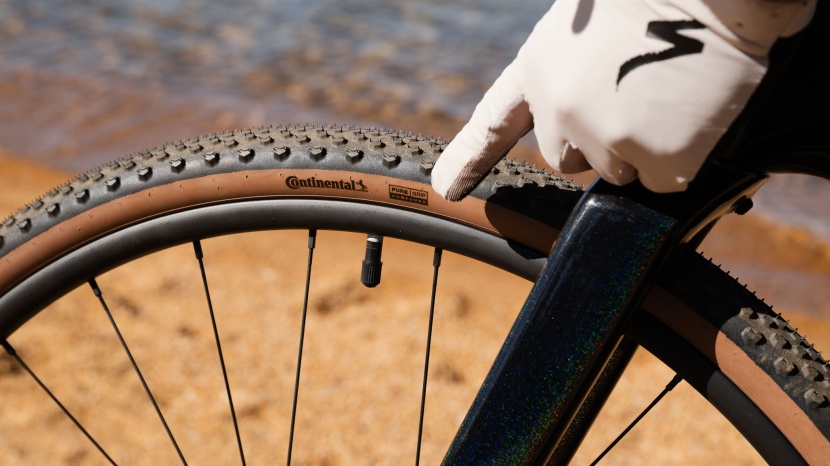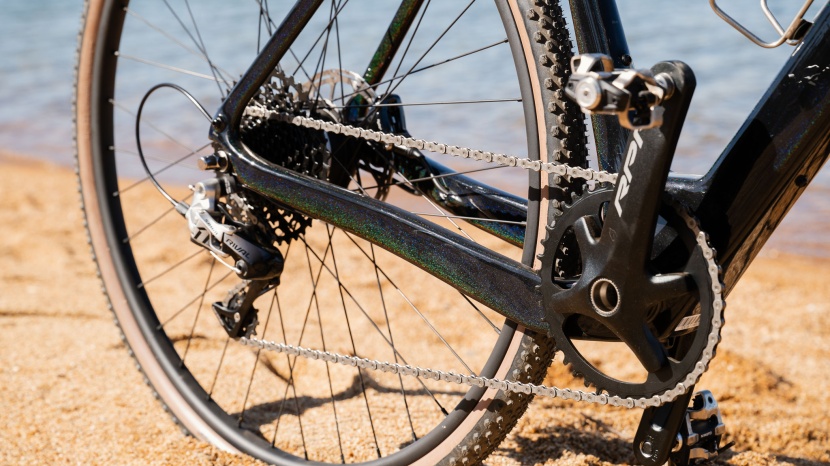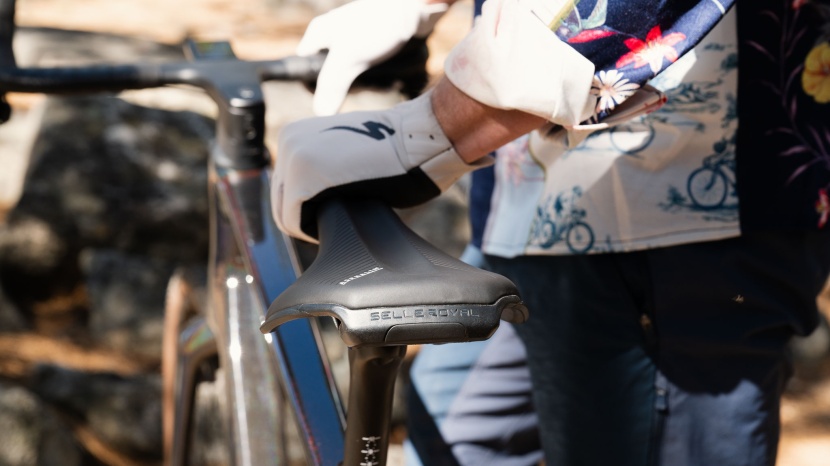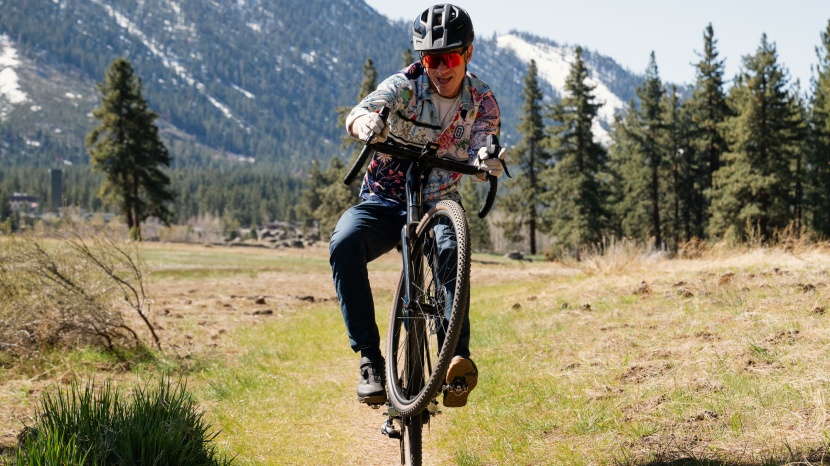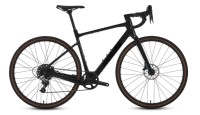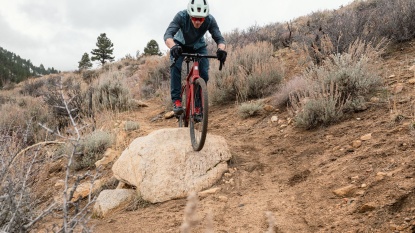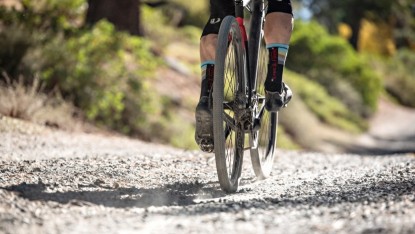Ride1Up CF Racer1 Review

Our Verdict
Our Analysis and Test Results
Frame Design
A lightweight carbon frame and fork built for the road with enough clearance for gravel tires, the CF Racer1 is a compelling product. This is a road bike that doesn't take itself too seriously. Its conservative geometry is arguably better on the road than it is in the dirt or gravel, but let's not let modern trends spoil the party. A 72-degree headtube angle and a 73-degree seat tube angle on our 56cm (large) model are separated by a 572mm top tube. Cables disappear under the stem and reappear just centimeters from the components they control; it's a very sleek look. 435mm chainstays are on the longer side, giving the bike a more relaxed wheelbase. There is a top tube bag mount and room for two water bottles, the downtube mount being a triple to accommodate larger volume loads. The frame is available in only two sizes, 50cm and 56cm, which correspond to its seat tube measurements.
Our test bike has a reach of 384mm and a stack of 615mm with a fairly long 190mm head tube. Our wheelbase measures 1040mm. The bottom bracket is 278mm from the floor, and the top tube has a slope of 11.9 degrees. The fork is spaced at 100mm and uses a thru-axle, while the rear end is spaced at 142mm and uses a proprietary derailleur hanger that is not UDH compatible. Our gravel spec test bike weighed in at 28.4 lbs with tubes in the tires and bare crank arms.
Design Highlights
- Available in 2 sizes (50-56cm)
- Carbon fork with no bosses
- Internal cable routing
- Rack and fender mounts
- Two double bottle bosses, one triple
- 50mm tire clearance
- Integrated seatpost clamp
Downhill Performance
With a 72-degree headtube angle, the bike is quick to change directions and puts the rider almost directly above the front axle. This is a little steeper than most, and it descends like it's gunning for the checkered flag. The front end can feel twitchy at speed, especially on the hoods, where it conveys less confidence. Under 20mph, this isn't much of a concern, as the sharp handling isn't exacerbated by your speed. On road descents, we could open the bike up to high speeds in the drops without getting nervous, but offroad, the bike felt less stable as we pushed toward its top assisted speed of 28mph.
A combination of its forward bias geometry and the motors help make the bike feel eager but also makes you feel exposed, up over the front end in a way that many modern gravel bikes don't. The SRAM Rival brakes are excellent at scrubbing speed, and the bike displays no lack of composure during braking; ample stopping power is available in the hoods or drops. At cruising speeds on gentle terrain, the bike is in its element, but on single track and steeper gravel roads, it's a bit more apprehensive. We sometimes grabbed the drops for stability in places where we'd normally ride the hoods. The higher stack height makes the drops readily accessible and allows you to keep your shoulders up a bit more. The position is more conducive to long days in the saddle than it is to attacking sprints.
The flared bars and SRAM Rival levers are exceptionally comfortable, provided they're in the right spot for you. The one-piece bar stem lacks any adjustability save for two 1cm spacers that can be moved above the stem for a lower stack height. A 42T chainring provides plenty of top speed for this platform, and 170mm crank arms only rarely contacted the ground off-road. The Continental Terra-Trail e-bike gravel tires are less than excellent from a performance standpoint, but they're relatively comfortable at 40mm, even with tubes installed. A bit more rubber on the ground would likely increase this bike's confidence. We would have appreciated the opportunity to set these wheels up tubeless to avoid pinch flats and get a bit wider contact patch, but the rims nor tires are tubeless compatible. Oddly, the gravel version of this bike uses Schrader valves.
Climbing Performance
The CF Racer1's geometry is effective for climbing without a strong bias for uphill use. A 73-degree seat tube angle gives it a neutral disposition, but the longer chainstays keep the rider's center of mass in front of the rear axle on steeper pitches. This is important as it affects how you can transmit power through the drivetrain, but it is less relevant for a bike that will be operated with pedal assistance. The 11-42 cassette gives ample range for attacking grades with or without the motor's help.
At 28.4 lbs, the CF Racer1 feels a little heavy for a gravel bike but incredibly lightweight for an ebike. It's only a couple of pounds heavier than many of the (analog/Amish/acoustic) gravel bikes we've tested. The weight only minimally affects its climbing performance with the motor off, but what you notice is how stiff the frame is. It doesn't climb with the typical finesse of a carbon frame; there's very little lateral flex and a very rigid platform that feels more like an aluminum bike in this regard. The SRAM Rival Ergofit levers provide an excellent perch for your ascent.
Turning the motor on changes everything; five levels of pedal assist are eager to propel you a grade. The 252Wh battery doesn't have a lot of power, but the 250-watt motor doesn't consume much. There is a balance of weight, power, and range, with each affecting the others, and no one bike will be ideal for everyone, but it seems like Ride1Up struck a nice balance with these numbers. The bike uses the Ride1Up (R1CBC) Current-Based-Cadence Sensor to signal power to the motor; it's better than a standard cadence sensor in many ways, delivering power in a smoother fashion and not having false starts. That said, it's not a torque sensor that delivers power based on how much pressure you're exerting on the drivetrain. Torque sensors offer superior performance, but this bike costs $2295! Climbing with the Current-Based Cadence sensor is relatively seamless; you feel its confusion in quick start technical riding where the motor doesn't always engage as quickly as you might expect.
Versatility
The CF Racer1 comes in two sizes and two models. The road model differs from the gravel model tested in a few key areas. Foremost, the wheels are different from the road model, which gets 40mm deep V rims that measure 17mm internally instead of the box section rims with 17.5 internals on our gravel setup. The road-going version of the bike gets handlebars with 3-degree flair instead of 15, a smaller 11-36 cassette, and Schwalbe E-One 700x32c tires. Both bikes have ample clearance for larger tires. We were able to run 700x50c tires, and they would work on either wheelset.
For users wanting more range, Ride1Up offers a 250Wh range extender battery that would almost double this bike's range. The battery mounts to the two-bolt water bottle cage on the seat tube and requires a bit of wiring, but it's not too difficult to manage. With the top tube bag mount, standard water bottle mount, and three-pack mount on the downtube, you can mount quite a bit of gear to the bike. It's not exactly a bike-packing setup, but we wouldn't hesitate to ride this bike on multi-day trips with access to a charger.
We suspect this bike will be purchased for a wide variety of uses; with its rack and fender mounts, it would make a good commuter, short-haul touring bike, or all-season drop bar trainer. Where this bike is limited in its versatility is fit. It's only offered in two sizes, and the cockpit has far less adjustability than most due to the one-piece carbon bar/stem combo.
Weight
Given what the CF Racer1 has under the hood, err downtube, the weight is quite impressive. Sure, 28.4 pounds is heavier than the rest of the bikes in our gravel bike review, but we're comparing apples to apple pie here. The bike has an impressive build spec; those not wanting electric assistance could easily justify buying this bike, removing the battery and replacing the rear wheel with a non-motorized hub.
The electric aspect of this bike feels subtle, you can easily ride the bike without even powering it up. Turning the bike on is done with a switch on top of the head unit and adjusting the power output is done with hidden remote buttons next to the hoods that can be reached from most handlebar positions. The bike is 4 lbs heavier than our next heaviest (non-electric) gravel bike, but that doesn't speak to the way the bike feels or performs. The weight of this bike should be a non-issue to anyone considering an electric gravel bike. Unless you're doing a considerable amount of riding with the motor switched off, you'd be hard-pressed to notice its additional mass. Riding in the lowest pedal assist mode more than compensates for the few extra pounds in most riding situations. In true gravel riding, where we got the bike out on forest service roads, the additional weight makes the bike float less; it doesn't levitate at speed the way some lighter and slacker bikes tend to. We were able to mostly compensate for this by substituting wider, higher-volume tires. We'd recommend anyone wanting to spend considerable time off-road to increase their tire volume as well; it did wonders for the ride.
Build
We can't talk about the build without talking about the price tag. Forget about the motor and battery for a moment, this bike is just more than half the price of the Santa Cruz Stigmata we tested recently. Many of the parts on this bike are superior to those on the Santa Cruz. We have nicer levers, brakes, and derailleur. The CF Racer1 gets a carbon bar/stem, carbon seat post, and a Selle Royal saddle. While not all carbon frame sets are created equal, the CF Racer1 feels pretty good; add in the motor and battery, and it's hard to believe the value being offered in this bike. While the one-piece carbon bar/stem combo looks really cool, you can't just swap a stem or turn it upside down to adjust the height. The overall build is quite impressive, we rated the build an 8 out of a possible score of 10.
If we were disappointed by anything, it would likely be the wheels and tires. A tubeless compatible rim and more rubber underneath us would have been welcome additions. The Schrader valves and the corresponding large holes in the rims felt like an oversight; we were glad to see the Presta valves in the road-going version. The bike also comes with a pair of fairly basic alloy flat pedals.
Groupset
The CF Racer1 is decked out with a SRAM Rival 11-speed drivetrain, not the Apex group we would have expected at this price point. Honestly, even Apex would have made this bike feel like an excellent value. This “groupset” includes the levers, brakes, cassette, chain, and rear derailleur. Ride1Up uses an RPP Prowheel crank with a 42-tooth chainring and the PG-1130 11-42-tooth cassette on the gravel build. The Rival 1 flat mount brakes connect to 160mm rotors, giving adequate stopping power for anyone up to the bike's 225 lb rider weight limit.
Should You Buy The Ride1Up CF Racer1?
Maybe you're interested in getting off-road without the weight and complexity of a mountain bike. Maybe you're a road rider who needs just a little assistance on the steepest sections or a bit of extra comfort on a drop bar bike. The CF Racer1 just may be the most economical solution but it won't fit everyone. Having only two sizes with limited adjustability gives this bike a narrower audience than it deserves. If it fits you, or you're willing to make it fit, the bike is an absolute bargain, but nothing about the bike feels cheap. Making it fit could mean replacing the handlebar and stem or changing the seat post offset, which would potentially involve a few hundred dollars. We'd caution you to be realistic about how much you can change the fit of this bike. If you're already riding gravel bikes and looking for an upgrade, you'd be wise to check the geometry, as this bike leans toward the road numbers.
What Other Gravel Bikes Should You Consider?
The Ride1Up CF Racer is an incredible value for an electric gravel bike. While we personally own a few electric gravel bikes, this is the first one to make it into our reviews. Most of the electric gravel bikes on the market right now start at about double this price, and carbon models can often cost an extra thousand dollars or more. The level of integration we've found on our Specialized Creo 2 is truly exceptional, but it's almost three times the price. If you could do without the electric power train, the current Santa Cruz Stigmata Carbon CC Apex is a fun, rowdy, and capable bike that will leave you feeling confident in places that might make other bikes cower.
| Awards | |
|---|---|
| Price | $2,295 List Check Price at Ride1up |
Overall Score  |
|
| Star Rating | |
| Bottom Line | Anyone interested in dabbling in the world of gravel riding, with assistance or not, should check out this versatile and affordable model |
| Pros | Bargain priced, Capable, Sporty and fast, Nice build |
| Cons | Limited sizing, Lack of adjustability, Less forgiving ride |
| Rating Categories | Ride1Up CF Racer1 |
| Downhill (30%) | |
| Climbing (30%) | |
| Versatility (20%) | |
| Weight (10%) | |
| Build (10%) | |
| Specifications | Ride1Up CF Racer1 |
| Measured Weight (w/o pedals) | 28 lbs 6 oz |
| Frame Material | Carbon Fiber |
| Wheelsize | 700c |
| Frame Size Tested | 56 |
| Available Sizes | 50-56 |
| Wheelset | Alloy Rims 17.5 id, 250W geared motor |
| Front Tire | Continental Terra Trail, 700 x 40c |
| Rear Tire | Continental Terra Trail, 700 x 40c |
| Shifters | SRAM Rival |
| Rear Derailleur | SRAM Rival 1x11 |
| Front Derailleur | N/A |
| Cassette | SRAM PG1130, 11-speed, 11-42T |
| Crankset | Pro Wheel RPP 170mm, 42T |
| Bottom Bracket | PressFit |
| Fork | Ride1Up Carbon |
| Seatpost | Ride1Up Carbon |
| Saddle | Selle Royal Asphalt GF |
| Handlebar | One piece Carbon 15-degree flair |
| Stem | One piece Carbon 15-degree flair |
| Brakes | SRAM Rival Hydraulic Disc |
| Measured Effective Top Tube (mm) | 572 |
| Measured Reach (mm) | 384 |
| Measured Head Tube Angle (degrees) | 72 |
| Measured Seat Tube Angle (degrees) | 73 |
| Measured Bottom Bracket Height (mm) | 274 |
| Measured Wheelbase (mm) | 1040 |
| Measured Chain Stay Length (mm) | 435 |
| Warranty | 1-year |


